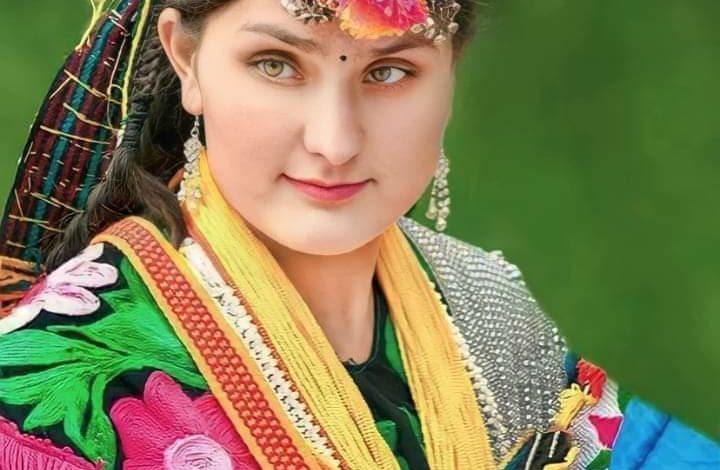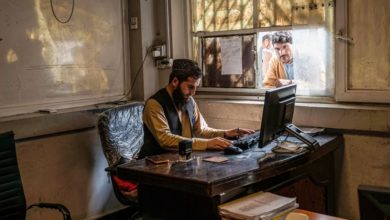From Marriage to Shadows: A Kalash Tale
I remember her exact features, her face, her smile, and the color of her outfit. One year isn’t a long time. Vague memories have been pouring out since I heard about her sad end. Now I am thinking, I wish I had never met her, had never seen her bright face, glowing small blue eyes, and lovely complexion. She is haunting me today.
It was summer, and the glory of Kalash Valley was at its peak. The welled-up springs, fruit-laden orchards, snow-capped mountains, and sky-high glaring hills presented the painting of the most beautiful landscape ever painted. When the tiresome walking and visiting of historical places ended, and the valley wore a nightgown, it became more mysterious and charming.
The thing I badly remember about the valley is its magical evening when everything seems long dead; complete silence envelops it as if some supernatural forces are at work. I was there for a week and had to depart the next day.
It was a night, usual and somehow unusual. I was staying in a hotel, and as the valley veiled darkness, I strode out to keep the promise “Miles to go before I sleep.” I didn’t think the night would be eventful when I set out that day. I had hardly walked half a Mile when I noted something unexpected. Under the crisp and clear starry sky, a silhouette appeared and disappeared behind a stone wall. Curiously, I paced a few steps and drew near to the spot. The vague image waved and gave a mischievous smile. I returned it and strode towards the lofty wall.
A Kalash girl was standing beside the wall, staring at me. I couldn’t discern her much; I just stole a glance and expressed my confusion. Soon, her smile was no more, and she was businesslike.
I understood.
The religious community often criticizes Kalash Valley for two reasons.
The first and probably the most menacing reprove drawing topic remains home-brewed wine in Kalash valleys consumed by Muslims and non-Muslims alike. However, potential customers are local and non-local visitors. “It ruins our youth and makes them immoral and addicted.” They argue.
The second subject of reprimand and rebuke, more or less, is promiscuity. “Drink the Tara, dance with Kalash girls, and make love. Our culture and religion are at risk. So are the Kalash people. If Taliban and religious fanatics attack, they should hold themselves responsible.” Some moderate clerics remark often.
The middle-sized, well-composed girl in Kalash’s outfit was standing and gazing. Her sparkling eyes, pinked, expressionless countenance, indifferent attitude, and dominating personality combined in an apt, natural way.
“How much do you charge for one night?” I came to the business straight.
“Not for the night. Just one time. I take 2000.”
“I will give you 5000. We will do nothing except talk.” I offered. She gave me a confused look. A deadly silence overtook. Moments later, she asked, “What will we talk about?” Her questioning eyes made me uneasy.
“About your business.”
“Is it worth talking about?” she frowned. A disappointed look was still in her bright eyes.
“In this mysterious land, with these killing eyes, yes.” I returned.
She paused for a moment, seemed skeptical. “Alright, I’ll take some time to think, and if I succeed in making up my mind, I will come to your room at 11 pm. Now, you should leave me alone and give me your address,” the girl said before leaving.
At 10 o’clock, I was in my room, smoking and thinking about the hazel-eyed girl. The clock struck 11, and she didn’t appear. I waited patiently. Half an hour later, someone knocked on my door.
“I have only one hour to spend with you. Whether it’s a task or talk, must be done quickly,” she said playfully, sitting in the chair, blushing and giggling.
Her outfit was typical of the Kalash culture, with a flowing embroidered skirt, a Kalash cap, and flowers and beads in her hair. Her mesmerizing look and piercing beautiful eyes on a round red face reminded me of a fairytale. When I looked at her, a pleasant sensation went through me. Her composed, lively, youthful appearance, confidence, boldness, and extroverted personality, fascinated and surprised me simultaneously. She was dominating.
“What is your name?” I asked feebly.
“Kalasha,” she answered, looking outside the window. A tense silence overtook the room. She began.
“Why are you so interested in mere stories?”
“A long story. To cut a long story short, I am a storyteller. Simply.” I said. “Tell me about yourself. How and why did you come to this business?”
“A long story, too,” she was mimicking me word for word and in the same tone. “Your bad luck, I might be unable to cut it short. Simply, I am the story.”
I was taken aback. She seems an educated, witty, and outspoken creature. Sharp and intelligent women always irritate me. Despicable. Fool, emotional, whimsical, spontaneous, reckless, I look for these traits in girls. Now, I was dealing with the one who was impressing rather than being impressed and possessing instead of being possessed.
“I think you have been to college and university,” I said, gazing at her eyes.
“Yes, twice went to college and once to University.” She mused as she saw the confusing fog on my face, continued. “A few years back, when I was admitted to Sher Paw Hospital in Peshawar, my dad took me to Islamia College two times. And you know, Peshawar University is a few yards away from this college. So I went to college twice and University once.” She laughed loudly, but I was baffled, couldn’t react.
The girl once again laughed hysterically and apologized.
“I understood your question, but whoever talks to me, ask this question. It is irritating. Now I crack a joke out of it.”
“You are here to answer my questions, not make fun of them,” I said, half seriously.
“Oh. You really think you have bought me for 5k.” She burst into laughter.
“How did you come to this business? “I asked again, now forcefully.
“Would you listen from the beginning to the end?”
“I am all ears.”
“Hmm. All right. I will skip many details. Will touch only some major events which led me to this business.”
Thus, she began her story. Here, I narrate it exactly.
I was born to a typical Kalash family; frankly speaking, I can’t recall the exact date I was born, poor memory indeed. My parents say it was 1999. I would like to skip the first decade of my life because I can’t tell much about my childhood. I was admitted to a school nearby. I couldn’t take much interest in curriculum activities, but the extra curriculum staff had a lot in store. I took more interest in teachers than in subjects.
When I got to the final years of school, I fell in love with my class fellow. He was Muslim by birth, and I was polytheist or pagan, also by birth. He proposed to me to get married. We both knew my family wouldn’t allow it. He came up with plan B, which was to run away.
At that immature age, you know one is reckless, acts on a whim, and so did I. I readily accepted it. But his plan C was hard to digest. He said his family will also not accept bringing a non-Muslim Kalash girl home. I was asked to convert to Islam. I was shocked. For three months, I remained indecisive. He was persistently persuading me, but I didn’t budge. Once, I asked him, “Why don’t you accept the Kalash religion? My family will accommodate both of us.” He was shocked.
Finally, he succeeded in luring me, and I gave my word to accept Islam. Soon, the day came when I eloped with him. A mosque imam was called in. I was asked to repeat some verses and Kalma. They congratulated me that I had accepted Islam and had joined the brotherhood. A moment later, the Nikah ceremony took place. It was totally different from what we had had in our Kalash culture.
His family, consisting of his parents, one brother, and two sisters, was one typical Muslim family. Later on, I came to know that he was engaged to his cousin. I found this extremely despicable. A time came when I felt that I should go back, but it was too late. There was no way back.
It was the end of life and the beginning of a new one. It took time to adjust myself to these surroundings. Every face was new and stranger. The most mind-boggling thing I faced daily was the queries, who was I? Why did I run away with the boy? Had I accepted Islam? Did I know how to pray? So on.
I answered a few, ignored many.
I could not overcome the nostalgic feelings. A sense of alienation and estrangement surfaced. One day, I told my husband I wanted to see my parents. He disproved, explained that they would turn me down. But I was persistent, and finally, he allowed me. I went to them.
There were mixed feelings. When she found me three months later at her doorstep, my mom burst into tears, embraced me, and welcomed me back, but my father didn’t want to see my face. He told Mom that either I should go or shun my newly adopted religion and husband. Mother tried her best to persuade me, but I didn’t give in. I had accepted Islam and married a man I loved. There was no way back. I returned calmly.
Once again, I was back in the vicious circle. A year passed, and I was nowhere. The culture I had left was not leaving me. It was a deep-rooted phenomenon, and I never thought at the time when I was starting the new life that I would remain a Kalash girl, no matter how hard I tried to shun it. My head was Muslim. My heart was Kalash. That is all.
Apart from this homesickness, cultural chains, and alienated feelings, my husband treated me like an inferior creature. I had to listen to their rebukes and racist comments and tolerate their mean behaviour toward me specifically and Kalash people generally. My husband’s attitude had changed entirely. A year ago, only love and compassion existed in his eyes; now, the cloud of hatred, humiliation, and disgust set persistently.
I was two months away from celebrating my first wedding anniversary when my husband brought his cousin home with whom he had engaged previously. It was the last nail in this coffin. It was time to leave this man and his family once and for all.
One day, I returned and told my parents I had left the previous husband and his religion. Now, my family didn’t agree to take me back. They argued that a person who remained for such a long time with such and such people and in their religion cannot be the same person. A Kalash person. I felt the roof crashing on me. My dad gave me a week’s ultimatum to leave his home. I didn’t avail it and left instantly.
The vicious circle enlarged. When I tried to marry a Kalash boy, he said I was a Muslim and had been with Muslims. When I approached Muslims, they labeled me Kalash, the worst heretic who accepted Islam and then quit it. None agreed to marry. I found myself nowhere. Totally lost. Deserted. I have been living in a rented dormitory for half a year. I have to pay bills, eat food, and wear clothes. I am compelled to meet these expenses.
Thus I came to this business. That was your question. I think you are a Muslim. Aren’t you? That is okay. Now Muslims and Kalash both come to me. I don’t discriminate. They discriminated.
She laughed hilariously with an expressionless face. I saw her hazel eyes drenched with tears. She paused, wiped her eyes, and started looking out the window. The cold wind blew softly. The story of the Kalash girl was nerve-wracking. I lost the sense of time, sense of myself.
“I will not take money for mere talking. I won’t charge you anything.” She said with a cracking voice. “You said you are a storyteller. Please don’t tell this story as long as I am not dead.”
“I would have to wait a long time.”
“You won’t wait long. The news of my death will be in the newspaper sooner than later.” She said and stared out the window. Her eyes told the tale of wretched, lonely, and forsaken women on the verge of suicide.
A tense silence overtook. I wanted to bid her farewell. Five thousand rupees were on the table. She shook her head and left. She never turned back to cast the last farewell gesture.
I packed and departed from Kalash Valley with a heavy heart the following day. The summer breeze was blowing. The melancholy voice of a distant Nightingale only heightened my sorrows. The lush green valley presents the picture of a wasteland.
A year has passed since that eventful night. A week ago, news was published that Kalasha had committed suicide by throwing herself in the river. “No cause of the suicide has yet come out.” It is reported along with the picture of a hazel-eyed girl.
I know the cause. I know these eyes, full of tears, welled up with long tales. A melancholy heart and torn apart body didn’t bother Muslims and Kalash to fight over the funeral ceremony. She didn’t ask them for a piece of land to be buried, a coffin, or a shroud to be put in. Kalasha simply drowned herself away…





A Well woven piece of art…. thought i was there to witness all this happened with you and your fictitious character amid the bushes of darkness spying over ….
Thank you brother for your kind words and encouragment.
You wish you had never met her. I wish I had never read this piece of writing.
It’s heartbreaking